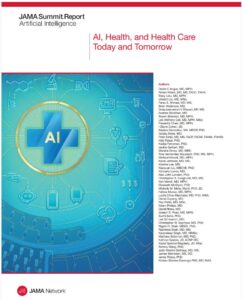CHICAGO, IL – Artificial intelligence (AI) carries promise and uncertainty for clinicians, patients, and health systems.
That’s why, in October 2024, JAMA and the JAMA Network hosted the JAMA Summit on AI, an in-person gathering of over 50 thought leaders whose expertise spans clinical care, research, software engineering, data science, health policy, law, and industry innovation. 
A year later, JAMA is proud to publish the JAMA Summit Report on AI, a Special Communication featuring over 50 authors.
Read: JAMA Summit Special Report: “Al, Health, and Health Care, Today and Tomorrow”
Can AI Improve Patient Care?
The JAMA Summit Report begins with an explanation of the broad nature and use of AI, including definitions of deep learning, generative AI, and agentic AI, and examples of the current clinical, direct-to-consumer, health care business operations, and hybrid tools in use today.
How Is AI Evaluated?
Next, authors discuss why AI tools require evaluation of their health effects, and how those evaluations can best be conducted. Defining intervention and context, identifying mechanism of action, capturing outcomes, and inferring causality are key.
The authors note that the impetus for peer-reviewed evaluation of potential health consequences appears strongest for tools most readily available to clinicians.
Regulation and Responsible Use
The report continues with a section on regulation of AI tools in health care, noting the US has no comprehensive “fit-for-purpose regulatory framework” for health and health care AI, followed by a section on the responsible use (implementation and monitoring) of AI in practice.
The report then includes a section on potential solutions, in which the 51 coauthors highlight four ideas: engage stakeholders in total product life cycle management; develop and implement proper evaluation and monitoring tools; build the proper data infrastructure and learning environment; create the right incentive structure.
Watch: JAMA Summit Report Authors Describe the Role of AI in Medicine
How Will AI Affect Health Care Workers?
Authors discuss the impact of AI on the health care workforce, noting shifting tasks across roles, requiring new skills like AI literacy, and prompting structural changes. While AI tools may reduce administrative burdens, authors raise concerns about job displacement, scope-of-practice conflicts, and equitable access.
“AI will massively disrupt health and health care delivery in the coming years,” the report concludes. “Given the many long-standing problems in health care, this disruption represents an incredible opportunity. However, the odds that this disruption will improve health for all will depend heavily on creation of an ecosystem capable of rapid, efficient, robust, and generalizable knowledge about the consequences of these tools on health.”
Read: Additional AI Research, Commentary from JAMA Summit Authors
“We Just Got Handed the Keys”
In a special episode of the JAMA+ AI Conversations podcast, lead author Derek C. Angus, M.D., M.P.H., broke down the key elements of the JAMA Summit Report with report co-author JAMA+ AI Editor in Chief Roy Perlis, M.D., M.Sc.
“It’s like we just got handed the keys to the fastest, most exciting car you could possibly imagine,” Dr. Angus says in the podcast. “And then you discover that there’s sort of no highway system, you know, and there’s no guardrails, and none of us have actually been taught how to drive.”
Listen: JAMA Summit Report Co-Authors Discuss Key Findings

AI Research Across the JAMA Network
Dr. Perlis also recorded a special anniversary podcast with JAMA+ AI Associate Editor Yulin Hswen, Sc.D., M.P.H. The editors each shared their favorite AI papers from 2024-2025. They also discussed their predictions for the direction of AI research in 2026.
This month, the editors published a new Resources page, featuring explainer videos and editor curated “Must Read” articles.
To receive the latest on AI from the JAMA Network, sign up for the JAMA+ AI email newsletter via the homepage and subscribe to the JAMA+ AI Conversations podcast.
Trying To Build Your AI Knowledge? Explore JAMA+ AI Resources
About JAMA Summit
The JAMA Summit is an initiative of JAMA and the JAMA Network that convenes leaders from across sectors and around the world to discuss and debate critical issues in medicine, health, and health care. Goals of the JAMA Summit are twofold: to host thought leaders from various sectors to discuss and debate the topic of interest with the goal of identifying actionable steps with immediate positive impact and to catalyze broader discussion prompted by themes that emerge from these convenings through the publications of papers and multimedia content. Learn about the 2023 JAMA Summit on Clinical Trials and read the resulting Special Communication. The Special Communication for the 2025 JAMA Summit on Firearm Violence will publish this year.
About JAMA+
JAMA+ channels are your source for the best science and commentary on critical topics in medicine published in JAMA, JAMA Network Open, and 11 specialty journals. Each JAMA+ channel is curated by an expert in the field and showcases original research, editorials, and medical news from across the JAMA Network. Our expertly curated content on JAMA+ AI highlights the role of artificial intelligence and digital medicine in health care. The newest channel, JAMA+ Women’s Health, delivers trusted clinical information that advances health care for women worldwide.
For interviews regarding the JAMA Summit Report: Allison Hydzik, Senior Director of Public Relations at UPMC and University of Pittsburgh Health Sciences, can assist with scheduling for Derek C. Angus, M.D., M.P.H., corresponding author of the Report. Allison can be reached at 412-559-2431 and hydzikam@upmc.edu.
For more information, contact JAMA Network Media Relations at 312-464-JAMA (5252) or email media relations.
